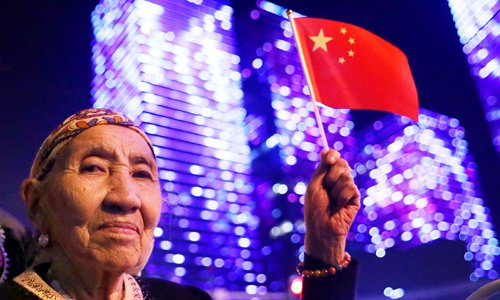
Photo: IC
In Kizilsu Kirgiz Autonomous Prefecture, Northwest China's Xinjiang Uyghur Autonomous Region, a touching tale about Mount Muztagata, a 7,546-meter peak on the Pamir Plateau, pervades the air. The name Muztagata means "father of icebergs."
A man called Muztagata, so goes the tale, always went to distant places to fight enemies, and when he finally came home, he found his wife and nine children, who had been waiting for him to come back, had turned into icebergs. Then Muztagata himself turned into a high mountain to accompany his family and safeguard what is now Bulungkol township, Akto county in Kizilsu Kirgiz Autonomous Prefecture, the westernmost part of China.
At the foot of Mount Muztagata, Li Wenjuan, chief of the Communist Party of China (CPC) local township committee in Bulungkol, told me the tale about love, home and country. But to me, the story of Li herself is more touching. The petite 29-year-old woman is as powerful as Muztagata.
In the past two years, Li and more than 10 local CPC officials have led 7,212 villagers belonging to Kirgiz, Tajik and Uyghur ethnic groups to construct roads, build parking lots, set up public toilets, open shops and rear cattle, helping the township attract more than 600,000 tourists in less than one year. The average income per capita of villagers has also risen from $400 to $1,000. "It is not that hard for our township to alleviate poverty comprehensively," Li said.
When visiting villagers together with me, Li gave details of the township and told interesting stories, words shooting out of her mouth fast. Every resident we met greeted Li with open arms and called her by her Kirgiz name Ayibulake, which means "moon-like pure and kindhearted girl." The villagers told me that they appreciate the CPC and that President Xi Jinping is a great leader.
Ayibulake is one among numerous young and enthusiastic college-educated officials in the Kizilsu Kirgiz Autonomous Prefecture. In 2014, President Xi encouraged college graduates to help develop China's rural and border areas. After that more and more young people came to and took roots in Xinjiang and soon became leaders to alleviate poverty and bring stability to villages.
Barin township, where a riot in 1990 took the lives of several police officers, was once the hub of terrorism in Xinjiang. Many Uyghur villagers who were misled by extreme religious thought once lived a miserable life - some were destitute while others gave their lives to nothing.
In contrast, residents in Barin now enjoy 24-hour hot water supply, tap water and indoor toilets. Moreover, violence or terror activities in the township have been non-existent for many years.
Aypara Askhar, secretary of CPC local township committee, a woman who was also born in the 1990s and who mocks herself on WeChat as "I can swallow bitterness," helped improve the living standards in Barin township. In the past two years, she led villagers to set up factories producing naan bread and construction materials in their village surrounded by the Gobi Desert. The factories have helped Muslims villagers multiply their income.
I cannot imagine what Askhar has been through in alleviating poverty in the village. And if I haven't paid a visit to the Kizilsu Kirgiz Autonomous Prefecture, I would have never known what changes those CPC officials brought to this vast and ancient land.
When I was undertaking research in Xinjiang in early October, US Secretary of State Mike Pompeo announced visa restrictions on Chinese officials for "repression in Xinjiang," which shows the US official is ignorant and prejudiced against Xinjiang. The US that once slapped a ban on Muslims from many other countries doesn't care about the Muslim community at all. It is only trying to stir up trouble and mislead the world on Xinjiang. No one should easily buy it when US politicians, Western media and so-called human rights organizations criticize the Chinese government over Xinjiang.
There are indeed underdeveloped places in Xinjiang. It is difficult for the local governments to maintain stability and officials need to improve their administrative skills, but what cannot be gainsaid is that Xinjiang has been free of violence or terror activities in the past three years, while people's per capita disposable income increased by 7.6 percent in 2018.
Although some Westerners are unhappy that Xinjiang did not become another Syria, all Chinese people are happy. The achievements in Xinjiang are a result of joint efforts made by ordinary people and officials who devote themselves to local development.
We should show our respect to them. If you have the opportunity to visit Xinjiang and see the region with your eyes, please don't hesitate to go. I will pay frequent visits to Xinjiang and I wish I could one day climb Mount Muztagata to feel the great power of love, home and country.
The author is professor and executive dean of Chongyang Institute for Financial Studies, at Renmin University of China and executive director of China-US People-to-People Exchange Research Center. His latest book Great Power's Long March Road was launched recently. wangwen2013@ruc.edu.cn



